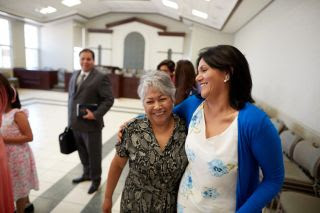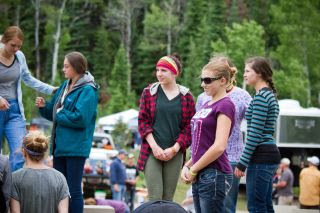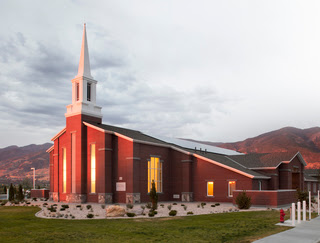In Part 1 of Debunking "30 Bizarre Mormon Rules You Won’t Believe Are Real", I covered the first five of thirty different false narratives about members of the Church of Jesus Christ of Latter-day Saints and our beliefs. If you're jumping into this current post from a search engine result, I recommend reading at least the first part of Part 1 for better context before continuing. I'll wait here. 😁
All done? Let's get cracking with these next five, shall we?
 |
| Women converse with each other at church in Mexico. |
16. No Caffeine
Costa and Starbucks are definitely off the menu for Mormons as they do not partake in tea or coffee due to the stimulant, caffeine which is seen as being a drug. Latter Day Saints have found ways to fill the gap by drinking concoctions of other drinks from recipes handed down by ancestors. Have they not heard of decaffeinated?
It's true that tea and coffee are proscribed by the Word of Wisdom (a name given to the law of health scripture the Lord revealed to Joseph Smith) touched on in Part 1. Here's a good article about it in the historical context of the original revelation. But there has never been any solid clarification on whether the issue is caffeine or some other aspect of tea (only certain kinds) and coffee (all kinds, even decaf).
If the issue is truly caffeine, then chocolate and other natural sources of caffeine would also be counseled against. But they're not. We LDS folks eat chocolate like there's no tomorrow (though we probably shouldn't in the spirit of better health). We love hot chocolate beverages (our substitute for coffee in social situations).
BYU, the Church's sponsored school, no longer prohibits caffeinated cola drinks in its vending machines or cafeterias, so it's not caffeine. It's even well-known that Elder Dieter F. Uchtdorf is a Diet Coke drinker (or maybe Diet Pepsi?), so, again, it's not likely the caffeine.
One 2013 study suggested that acrylamide, a Group 2A carcinogen, which is created during the roasting process, can be harmful over the long term and/or in high concentrations. Other studies also looked into it. More research is needed to determine whether drinking coffee is a significant risk.
So why not drink tea and coffee if there are no obvious health downsides and plenty of scientifically-claimed upsides (even though those upsides can arguably be gained in other ways without coffee)?
While the Lord has not given us specifics, we commonly accept that anything that is as addictive or at least dependency-creating as coffee and tea can be (for whatever other possible reasons besides caffeine) is not good for us.
And, yes, this also extends to too much sugar and any other substance or activity that rewards the addiction-forming neural and endocrine pathways.
Sure, coffee and tea aren't in the same category as, say, heroin, methamphetamine, or cocaine. Nevertheless, everyone "knows" that coffee is an addiction or dependency because it's as difficult for many people to quit drinking as it is to quit smoking cigarettes. Here's an interesting anecdotal article about one person's journey to quit sugar, coffee, and cigarette addictions.
It's also helpful to consider the fact that when the Word of Wisdom was first revealed, absolutely nobody was concerned about tobacco as a health risk. In fact, for decades there were actual doctors (incentivized by the tobacco industry) who told patients regularly that smoking was good for them. Even to the point of recommending certain brands.
Why is that helpful? Because the Lord warned us in 1833 of "evils and designs which do and will exist in the hearts of conspiring men in the last days" to damage our health. It wasn't until 1958 (!) that there began to be warning labels to try to stop people from hurting themselves.
That, and the other prohibitions and prescriptions in the Word of Wisdom, gave LDS folks a 125-year healthy-living knowledge head start on the scientific establishment.
We didn't need to know each of the scientific reasons. We just needed faith to follow God's words. I trust God that it will eventually be the same outcome with coffee and tea.
17. Set Forth And Multiply
In Britain, 2.4 children is the usual size of a family. With Mormons, it is more like 9.8 for an average brood. Their religion states that children are a gift from the Lord and even if the parents are experiencing financial hardships, this should not be taken into account when looking to fill those other bedrooms.
If, as is common with these hit pieces on LDS living, the author is implying that all "Mormons" are from Utah, then even that is wrong. Pamela S. Perlich, Ph.D. says:
Utah’s fertility rate has fallen significantly since 1960, when it was 4.30 children per woman, to 2.33 in the most recent data for 2014. This is an historically low fertility rate for Utah, and only slightly exceeds the replacement level of 2.1.That's simply because Utah is not some exotic, faraway, isolated compound where only throwback "Mormon" hicks live and reproduce with abandon. It's a modern U.S. state with many decades of being integrated with the rest of modern American society, including such things as birth control, technological innovation, and migrations of people in and out of the state. It's not ever been 100% LDS people. Right now it's hovering around 60% LDS membership, but probably around 40%-50% or less are active members.
A word like "brood" is not helpful nor tolerant. It implies that we are breeding, or being bred, like mindless rabbits or sheep. Every child we have is precious to us. With some exceptions where households suffer from marital disharmony or abuses, most children born into most faithful LDS households are wanted. That's because, in general, we do believe that children are a gift from the Lord, not a burden or an accessory.
18. Sexy Clothing"Even reading the word 'sexy clothing' would lead to shame..." No, it wouldn't. We're not prudes.
Even reading the word ‘sexy clothing’ would lead to shame in the Mormon religion. Females, even married women, should not go sleeveless or wear anything tight or figure-hugging. This is seen as, to be blunt, trashy and disrespectful to the whole and extended family.
Yes, we do fast and pray for that period of time. At least, that's the ideal that we are taught. I personally struggle to A) remember that it's Fast Sunday and B) start and end my fast exactly within 24 hours. Lots of people do. Others struggle with not drinking water or not having a little nip of food here and there. It's ok. Fasting is part of the doctrine of elevated prayer, of course. But the particulars of fasting for a 24-hour period one Sunday a month is a policy bordering on a tradition.19. Fasting
Mormons fast one Sunday every month for 24 hours. That extends to not drinking any water either for the duration. The money that would have been spent on two meals for the family is then donated to the poor and is known as ‘Fast Sunday’ – who thought that name up?
20. DinosaursThis allegation is only true in the realm of speculations that some members of our faith indulge in from time to time. Like most human beings, we are curious about the world around us. Our faith is part of that curiosity. So when we hear about scientific principles or discoveries, we naturally try to find ways to align them with what we know in our hearts about God. Dinosaurs coming from other planetary materials used to make this earth, and many other strange and unusual ideas, do emerge from time to time. Like all news about us, these ideas get "press" mostly for the fact that they are strange and unusual.
You read that correctly! What on earth are dinosaurs to do with the Mormon religion? Well, ‘earth’ is the operative word as this faith teaches kids that fossilized dinosaur bones come from other creatures living on other planets that were destroyed when Earth was created. I don’t know what planet these teachers were from!
We believe all that God has , all that He does now reveal, and we believe that He will yet many great and important things pertaining to the Kingdom of God.




